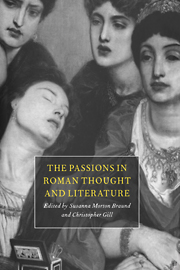Book contents
- Frontmatter
- Contents
- Preface
- Conventions
- Introduction
- 1 Epicurean anger
- 2 Cicero and the expression of grief
- 3 The subjugation of grief in Seneca's Epistles
- 4 A passion unconsoled? Grief and anger in Juvenal Satire 13
- 5 Passion, reason and knowledge in Seneca's tragedies
- 6 Imagination and the arousal of the emotions in Greco-Roman rhetoric
- 7 Pity, fear and the historical audience: Tacitus on the fall of Vitellius
- 8 All in the mind: sickness in Catullus 76
- 9 Ferox uirtus: anger in Virgil's Aeneid
- 10 ‘Envy and fear the begetter of hate’: Statius' Thebaid and the genesis of hatred
- 11 Passion as madness in Roman poetry
- Bibliography
- Index of ancient passages
- General index
5 - Passion, reason and knowledge in Seneca's tragedies
Published online by Cambridge University Press: 18 December 2009
- Frontmatter
- Contents
- Preface
- Conventions
- Introduction
- 1 Epicurean anger
- 2 Cicero and the expression of grief
- 3 The subjugation of grief in Seneca's Epistles
- 4 A passion unconsoled? Grief and anger in Juvenal Satire 13
- 5 Passion, reason and knowledge in Seneca's tragedies
- 6 Imagination and the arousal of the emotions in Greco-Roman rhetoric
- 7 Pity, fear and the historical audience: Tacitus on the fall of Vitellius
- 8 All in the mind: sickness in Catullus 76
- 9 Ferox uirtus: anger in Virgil's Aeneid
- 10 ‘Envy and fear the begetter of hate’: Statius' Thebaid and the genesis of hatred
- 11 Passion as madness in Roman poetry
- Bibliography
- Index of ancient passages
- General index
Summary
Mme Martin: Quelle est la morale?
Le Pompier: C'est à vous de la trouver.
(Eugene Ionesco, La cantatrice chauve)‘There is no such thing as a good influence, Mr Gray. All influence is immoral – immoral from the scientific point of view.’
(Oscar Wilde, Portrait of Dorian Gray)Tragedy and passions
I am painfully aware that the title of this chapter could well be the subtitle to a general essay on Senecan drama. This is a possible source of confusion I would like to dispel right away. It is true that the contrast between passion and reason is often named as the crucial tension animating these tragedies. But, as I am not attempting to offer here a general introduction, I do not focus primarily on the usual issues concerning the articulation of passions in the plays. My topic is more circumscribed: how passions can be described as the driving force not just behind the actions of characters but also behind the very existence of the tragedies, and especially how this genetic function is represented in the tragedies themselves.
Merely entertaining the hypothesis that passions might generate tragic poetry inevitably makes us face some familiar questions on the relationship between the tragedies and the rest of the Senecan corpus. One could claim that those questions are useless. Some critics could invoke the principle that we should read each tragedy as a separate and self-standing unit. Others could claim that the attempt to relate the tragedies, at any cost, to Senecan philosophy is a petitio principii: we ask how the tragedies can be compatible with the philosophy because we have already decided that they must be, since they were written by the same person.
- Type
- Chapter
- Information
- The Passions in Roman Thought and Literature , pp. 89 - 111Publisher: Cambridge University PressPrint publication year: 1997
- 41
- Cited by

